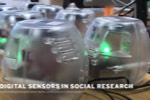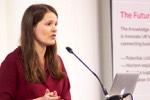2018
Major Car Brands encouraged to contribute to vital standards work
3 September 2018: As cars become reliant on on-board cameras for automated operation, the consequences of any flaws in the quality and interpretation of images sent to decision-making systems starts to become a matter of life and death. So an agreed way to benchmark image quality is imperative, yet no specific product standard for automotive applications currently exists.
This realisation prompted sensor system engineers to initiate the process of writing such a standard, and having analysed existing standards, an industry working group is now looking to open discussion to include representation from across the supply chain. Read More
3 September 2018: As cars become reliant on on-board cameras for automated operation, the consequences of any flaws in the quality and interpretation of images sent to decision-making systems starts to become a matter of life and death. So an agreed way to benchmark image quality is imperative, yet no specific product standard for automotive applications currently exists.
This realisation prompted sensor system engineers to initiate the process of writing such a standard, and having analysed existing standards, an industry working group is now looking to open discussion to include representation from across the supply chain. Read More
Patience and a balanced approach leads to successful research recruitment
6 June 2018: Participant recruitment is a crucial success factor in research on human subjects, yet its significance for the validity of research outcomes is commonly glossed over, at least in public.
“Recruitment is an issue that tends to be underplayed”, commented Kristrún Gunnarsdóttir when looking back at some of the hurdles faced by the HomeSense field trial.
“… and it is something that should be more openly discussed.” Read More
6 June 2018: Participant recruitment is a crucial success factor in research on human subjects, yet its significance for the validity of research outcomes is commonly glossed over, at least in public.
“Recruitment is an issue that tends to be underplayed”, commented Kristrún Gunnarsdóttir when looking back at some of the hurdles faced by the HomeSense field trial.
“… and it is something that should be more openly discussed.” Read More
Greenwich CAV testbed finds positive support for autonomous vehicles but safety concerns paramount
6 June 2018: As networking events for new rounds of Connected & Autonomous Vehicle research funding open for registration, we look back at the first city testbed. Read More
6 June 2018: As networking events for new rounds of Connected & Autonomous Vehicle research funding open for registration, we look back at the first city testbed. Read More
NaviGoGo Mobility-as-a-Service pilot changes perceptions of travel users in Scotland
30 May 2018: New mobility services will arise from innovations in technology and business models. KTN is helping businesses investigate the opportunities. Read More
30 May 2018: New mobility services will arise from innovations in technology and business models. KTN is helping businesses investigate the opportunities. Read More
Nearing a decade of government investment in UK low carbon vehicle technology proofs of concept
29 May 2018: Since early 2009, Innovate UK (previously Technology Strategy Board) has run a series of low carbon vehicle research, design, development and demonstration competitions under its Low Carbon Vehicle Integrated Delivery Programme (IDP) brand. To date, fourteen IDP competitions have been held, sometimes as often as every six months or so, in partnership with other government research funding bodies, principally the Office for Low Emission Vehicles (OLEV).
KTN has also been instrumental in helping nature collaborations for IDP competition, including facilitating networking and pitching events. Read More
29 May 2018: Since early 2009, Innovate UK (previously Technology Strategy Board) has run a series of low carbon vehicle research, design, development and demonstration competitions under its Low Carbon Vehicle Integrated Delivery Programme (IDP) brand. To date, fourteen IDP competitions have been held, sometimes as often as every six months or so, in partnership with other government research funding bodies, principally the Office for Low Emission Vehicles (OLEV).
KTN has also been instrumental in helping nature collaborations for IDP competition, including facilitating networking and pitching events. Read More
Jie Jiang visiting Computational Intelligence Group in Amsterdam to study machine learning methods
21 May 2018: Dr Jie Jiang is currently working as a visiting researcher with Dr Mark Hoogendoorn at the Computational Intelligence Group in the computer science department at the Vrije Universiteit Amsterdam.
Dr Hoogendoorn has extensive experience of working with sensor-generated data, with particular expertise in applying machine learning in the domains of eHealth and mHealth. Read More
21 May 2018: Dr Jie Jiang is currently working as a visiting researcher with Dr Mark Hoogendoorn at the Computational Intelligence Group in the computer science department at the Vrije Universiteit Amsterdam.
Dr Hoogendoorn has extensive experience of working with sensor-generated data, with particular expertise in applying machine learning in the domains of eHealth and mHealth. Read More
Meridian to invest in projects for sharing road transport data between infrastructure and connected or autonomous vehicles
18 May 2018: Meridian is to invest in two rounds of funding calls, most imminently relating to data sharing and standards. Read More
18 May 2018: Meridian is to invest in two rounds of funding calls, most imminently relating to data sharing and standards. Read More
Workshops point to a multi-million-pound opportunity for electric vehicle charging innovation
14 May 2018: The government wants to accelerate take-up of electric vehicles, which will require new on-street charging solutions, reports Tim Watt. Read More
14 May 2018: The government wants to accelerate take-up of electric vehicles, which will require new on-street charging solutions, reports Tim Watt. Read More
Taking stock by looking back at the HomeSense field trial
10 May 2018: With the HomeSense field trial completed, now is an opportunity to share some of the lessons learned on the way to capturing good data. Read More
10 May 2018: With the HomeSense field trial completed, now is an opportunity to share some of the lessons learned on the way to capturing good data. Read More
Using sensors in social research, an experiential way to learn how sensors might enrich research designs
14 March 2018: As a researcher considering your next project you might well be expected to ask: what are my most important research questions and what methods do I have in my armoury for gathering valid data? Read More
14 March 2018: As a researcher considering your next project you might well be expected to ask: what are my most important research questions and what methods do I have in my armoury for gathering valid data? Read More
DETC affiliate case study: Target 3D
26 February 2018: Target3D is a small operation making good use of DETCs incubation office and demonstration facilities to nurture its emergence in the developing areas of motion capture and object tracking in 3D space.
Working out of DETCs office here at Stratford, Target3D offers consultancy in 3D technologies and is the sole UK distributor of OptiTrack optical tracking solutions. Plus, as our on-hand 3D motion capture experts, can support other DETC affiliates for all things tracking and 3D tech. Read More
26 February 2018: Target3D is a small operation making good use of DETCs incubation office and demonstration facilities to nurture its emergence in the developing areas of motion capture and object tracking in 3D space.
Working out of DETCs office here at Stratford, Target3D offers consultancy in 3D technologies and is the sole UK distributor of OptiTrack optical tracking solutions. Plus, as our on-hand 3D motion capture experts, can support other DETC affiliates for all things tracking and 3D tech. Read More
Short course ‘Using sensors in social research’
19 February 2018: The Centre for Research in Social Simulation (CRESS) at the University of Surrey has announced the short course, Using sensors in social research, Monday 10 and Tuesday 11 September 2018. Hosted at the University on Stag Hill in Guildford (see Google map), this will be an opportunity for research practitioners to learn about the use of digital sensors from members of the ESRC/NCRM funded HomeSense project. Read More
19 February 2018: The Centre for Research in Social Simulation (CRESS) at the University of Surrey has announced the short course, Using sensors in social research, Monday 10 and Tuesday 11 September 2018. Hosted at the University on Stag Hill in Guildford (see Google map), this will be an opportunity for research practitioners to learn about the use of digital sensors from members of the ESRC/NCRM funded HomeSense project. Read More
CANDID final conference – wrapping up a research journey into communications between SSH and ICT communities
February 14, 2018: The concluding conference of the CANDID project was held at The Waag (weigh house), a 15th-century building on Nieuwmarkt square in Amsterdam. Originally a city gate and part of the walls of Amsterdam, the building has in its long history also served as a guildhall, museum, fire station and anatomical theatre.
It was depicted in Rembrandt‘s 1632 painting The Anatomy Lesson of Dr. Nicolaes Tulp, but these days it functions as another type of hack space, as the base for the Waag Society, a foundation that fosters experimentation with new technologies. Read More
February 14, 2018: The concluding conference of the CANDID project was held at The Waag (weigh house), a 15th-century building on Nieuwmarkt square in Amsterdam. Originally a city gate and part of the walls of Amsterdam, the building has in its long history also served as a guildhall, museum, fire station and anatomical theatre.
It was depicted in Rembrandt‘s 1632 painting The Anatomy Lesson of Dr. Nicolaes Tulp, but these days it functions as another type of hack space, as the base for the Waag Society, a foundation that fosters experimentation with new technologies. Read More
Demystifying technology important for obtaining trust and cooperation from HomeSense participants
30 January 2018: Six months into the HomeSense project, Professor Nigel Gilbert outlined the “interesting ethical issues” then needing to be answered before the required data collection could responsibly get underway in participants’ homes.
As described in his presentation, ‘The Ethics of Sensors’, for the 2016 NCRM Research Methods Festival at University of Bath, the ambition of HomeSense is to enable social researchers to use digital sensors alongside self-reported methods or observations. The project is also assessing the extent to which householders might accept sensors in their homes for research, and the final output will be a set of guidelines for use in such studies. Read More
30 January 2018: Six months into the HomeSense project, Professor Nigel Gilbert outlined the “interesting ethical issues” then needing to be answered before the required data collection could responsibly get underway in participants’ homes.
As described in his presentation, ‘The Ethics of Sensors’, for the 2016 NCRM Research Methods Festival at University of Bath, the ambition of HomeSense is to enable social researchers to use digital sensors alongside self-reported methods or observations. The project is also assessing the extent to which householders might accept sensors in their homes for research, and the final output will be a set of guidelines for use in such studies. Read More
CANDID Primer and Policy Recommendations to be unveiled at concluding Conference
January 11, 2018: The CANDID project is now complete, with all deliverables due for the period of the project delivered to the Commission and also available for download. What remains is to celebrate these achievements and to present and discuss the CANDID Template, rebranded The CANDID Primer, as well as the accompanying Policy recommendations. Read More
January 11, 2018: The CANDID project is now complete, with all deliverables due for the period of the project delivered to the Commission and also available for download. What remains is to celebrate these achievements and to present and discuss the CANDID Template, rebranded The CANDID Primer, as well as the accompanying Policy recommendations. Read More














